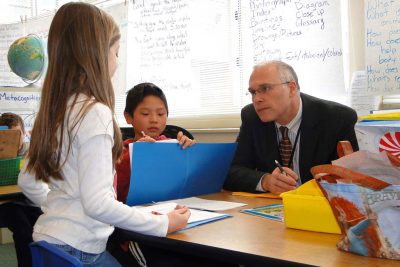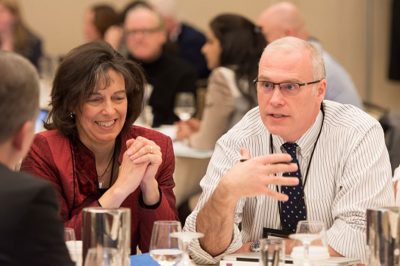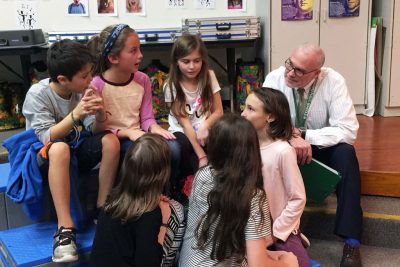In our recurring 10 Questions series, the Neag School catches up with students, alumni, faculty, and others throughout the year to offer a glimpse into their Neag School experience and their current career, research, or community activities.
Paul Freeman ’07, ELP, ’09 Ed.D. is in his 10th year as the superintendent of Guilford (Conn.) Public Schools and has almost 30 years of administrative and teaching experience in Connecticut schools. Freeman earned an Ed.D. in 2009 from the Neag School of Education. In addition to having recently been named the state’s Superintendent of the Year by the Connecticut Association of Public School Superintendents (CAPSS), he had been recognized in 2014 by the Neag School as Outstanding Superintendent of the Year.

Why did you decide to pursue a doctorate in educational leadership (Ed.D.) at the Neag School?
The opportunity to pursue an Ed.D. presented itself in a way that was too good to pass up. I was a building principal in East Lyme at the time, and the superintendent, Jack Reynolds, entered into an agreement with the Neag School, which located a doctoral cohort around the East Lyme and New London area. Many of the class meetings actually took place in the school in which I served as principal, and Reynolds made it clear that he expected that I would enroll in the program. He believed in me and pushed me. It was the encouragement and the support of a superintendent who knew me and took an interest in my growth, when I was a young school leader, that led me to pursue my Ed.D. I took great pride in my doctoral studies at UConn, and I continue to take great pride in being a UConn alum.
“I took great pride in my doctoral studies at UConn, and I continue to take great pride in being a UConn alum.”
— Superintendent Paul Freeman ’09 Ed.D.
What was your dissertation on and how has it helped you in your career?
My dissertation focused on the professional learning of principals and looked at how early-career principals became effective and impactful, at how they made positive change. The work in the Ed.D. program helped in countless ways. The relationships that I developed within the cohort structure remain with me today, and I work closely now with colleagues from within that cohort. The professors, practitioners, and advisors whom I met through the program, particularly [Professor Emeritus] Barry Sheckley, Casey Cobb, and Robert Villanova, became mentors and friends who shaped the way I saw leadership. The learnings that I took away and the habits that I formed during that time further helped shape the leader that I was becoming. The work on the dissertation itself changed the way I viewed the principalship, and it has guided my ideas about growing and supporting impactful principals for our schools.

What does it mean to you to be recognized by CAPSS as Superintendent of the Year?
It is humbling, as I know that there are many, many talented and impactful, and deserving superintendents in Connecticut; most of them are my friends, and any one of them could have been selected to represent superintendents this year. It is also enormously uplifting and affirmational, especially because it comes from peers, from people who I view as mentors and role models, and because it comes in this most challenging of years.
You went from being an English teacher to a school administrator to a district leader. Why did you originally want to be an educator and what inspired you to move from the classroom to administration?
I think I always knew that I was going to be a teacher. What drew me into administration was a desire to expand my influence and the impact that I could have on expanding possibilities for students. I loved, and still love, the classroom, but I thought I could do more as a school leader.
What made you want to be an instructor for the Neag School’s superintendent, principal, and teacher preparation programs, and what’s it like being back in the classroom, this time with an older student population?
I think it was the same desire to expand my influence that led me into school administration. Just as I have been shaped by mentors who took an interest in me in my early career, just as I was influenced by professors and practitioners through my courses in the Neag School, the idea that I could lend a supportive hand to aspiring teachers and principals and superintendents was (and remains) an exciting and attractive idea. The day that I was invited to teach in the Neag School was one of the proudest moments of my professional career.
I have four sons who will often tell people that I used to be a teacher. I take great pride in the fact that I have never stopped being a teacher. I think teaching in the Neag School allows me to continue to stay connected to the realities of the classroom. I think that older, professional students are certainly different than K-12 students in many ways, but in many ways continuing to be responsible for classroom instruction of my own has helped me to stay connected to teaching and learning.
And this past year, being responsible for shifting instruction from in-person classroom settings to the Zoom setting has helped me to understand, at least a little, what we are asking of teachers and students in our K-12 settings.

With COVID this year, what have been some of your biggest challenges and decisions?
Working to keep schools open, at least to some degree, has been the greatest challenge. Keeping students safe and healthy while keeping them learning. Knowing how important schools are to children, and at the same time knowing how real the risks to health and well-being are that are posed by this virus … there is a real weight that comes in balancing those competing goods … that has been a challenge this year.
How can educators and administrators better address civil unrest?
I think we have a real opportunity in our country, at this moment in time, to discuss issues of social justice and real equity in our schools and in our communities. I think it is incumbent upon educators to engage in, and to lead, those conversations, despite pushback that we may receive. I know that I don’t know how to do any of this “better” than anyone else. I am the last person to tell others “how” to do this work. But I do know that it is important that we all keep trying to do it. We will make mistakes; I have made mistakes, but we need to keep working at it, we need to keep talking about race and racism and privilege, as uncomfortable as that makes us. The real danger lies in silence.
“I think we have a real opportunity in our country, at this moment in time, to discuss issues of social justice and real equity in our schools and in our communities.”
— Superintendent Paul Freeman ’09 Ed.D.
You are serving as co-chair of Connecticut’s COVID-19 Learn From Home Task Force. What were some key outcomes of that initiative?
I was privileged to work with [Neag School alum and East Hartford Public Schools Superintendent] Nate Quesnel and the other superintendents who served on this task force. With financial support provided by the Dalio and the Nooyi families, and logistical support from the Connecticut State Department of Education and the governor’s office, we distributed over 60,000 laptops and over 200,000 backpacks to students during the early days of the pandemic. Distance and hybrid learning have impacted all our students in Connecticut, but we know that some groups of students have been disproportionately impacted. The Learn From Home Task Force was able to prioritize Alliance Districts [the lowest-performing school districts in Connecticut] for these resources, and we were able to get computers and books into the homes and into the hands of kids who needed them the most.
What are some lessons you have learned from your experience as a district leader during the pandemic thus far? What do you look forward to most when things return to normal?
I have learned a lot over these past 10 months. I have learned about health and safety protocols, quarantine periods, and virtual and distance learning pedagogy. Most importantly, though, I have learned, or relearned, about the importance of flexibility and compassion, and about the primacy of social and emotional wellness in learning. I have learned that teachers will rise to any challenge that gets placed in front of them and that leaders lead best when they communicate openly and honestly, even about their own fears and the limits of what they know.
I look forward to opening schools, full days, complete schedules, loud and bustling classrooms, and smiles not obscured by masks. I look forward to that day, which will be soon, I hope.
What are you most proud of in serving as a superintendent, and what would you say to anyone considering a career in superintendency?
I am proud of the teams on which I have participated. I am proud of the impact for good that those teams have had. I am proud of the students and teachers and principals with whom I have worked over these many years. I am very proud of even the small part that I have played in the successes of those many students and teachers and principals with whom I have worked over the past 30 years in education in Connecticut.
Being an educator is the most important thing that anyone can choose to do. It is important and rewarding work. I have been an educator for a long time now, in a variety of roles, and I have loved them all, but I cannot think of anything I would rather be, at this moment in my career, other than a superintendent. It is the best job in the world.
Read past installments of the Neag School’s 10 Questions series.
 Facebook
Facebook
 Twitter
Twitter
 LinkedIn
LinkedIn
